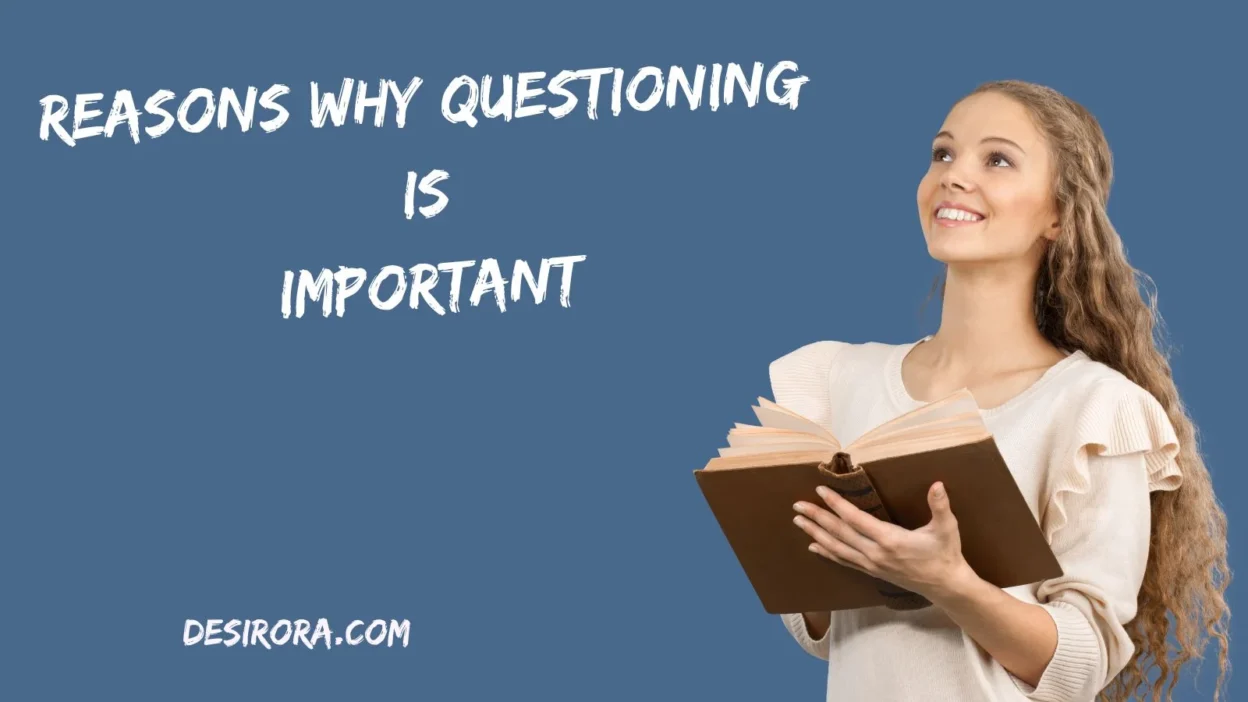Have you ever stopped and asked yourself, Why am I doing this? or What could happen if I did it differently? Those simple questions can open up new paths, fresh insights, and deeper engagement with life. In fact, questioning is one of the most important skills we can develop. It’s more than curiosity—it’s a deliberate tool for learning, growth, and connection.
This article explores the reasons why questioning is important—how it shapes learning, relationships, innovation, and self-awareness. Along the way, you’ll see examples, types, idioms, and practical tips to help you master the art of asking powerful questions.
What “questioning” really means
Before diving in, let’s define it.
Questioning means:
- Asking why, how, and what if, not just yes/no.
- Staying curious instead of passive.
- Using questions to explore, understand, and challenge ideas.
- Seeking dialogue, not just answers.
Questioning isn’t about being negative—it’s about being engaged and analytical.
For example:
“What if we approached this from another angle?”
is far more productive than
“This will never work.”
Key Reasons Why Questioning Matters
Stimulates Curiosity and Lifelong Learning
Every great discovery starts with a question. When you ask “why” or “what if,” you fuel curiosity—the foundation of lifelong learning. Instead of memorizing facts, you start connecting ideas, seeing patterns, and exploring possibilities.
Example:
Rather than asking, “Where’s the save button?”, ask: “What happens if I don’t save? Can I automate it? How would that change my workflow?”
That curiosity turns routine learning into mastery.
Promotes Critical Thinking and Problem-Solving
Questioning sharpens your reasoning. It pushes you to analyze assumptions, evaluate evidence, and consider multiple viewpoints.
Here’s how it works:
- Spot hidden assumptions: “What are we assuming here?”
- Encourage analysis: “Why does this happen?”
- Explore consequences: “What if we didn’t do this?”
- Evaluate choices: “Which option makes the most sense?”
- Generate ideas: “How could we design this differently?”
Example:
In a team meeting, asking “Are we sure this solution fits our real problem?” can save hours of misdirected effort.
Enhances Understanding and Retention
When you question something, you interact with it. That mental engagement helps you remember and truly understand what you learn.
Synonym Table:
| Questioning-Verb | Meaning |
| Probe | Ask deep questions to uncover meaning |
| Query | Raise a doubt or inquiry |
| Challenge | Test the truth or validity |
| Investigate | Explore by asking questions |
| Interrogate | Examine systematically |
Example:
Instead of just memorizing a date in history, ask, “Why did this event happen here and not somewhere else?” That curiosity strengthens comprehension and recall.
Drives Personal Growth and Self-Reflection
Self-questioning helps you understand yourself better. Questions like “What do I really want?” or “Why did I react that way?” lead to personal insight and emotional intelligence.
Example:
After a disagreement, you might ask: “What triggered my response? Was it the situation or my perception?”
That reflection helps you grow rather than repeat the same mistakes.
Fosters Better Communication and Relationships
Good questions build trust. When you ask with genuine curiosity, people feel heard and valued.
Common idioms for curious communication:
- Ask away! – You’re welcome to ask anything.
- Question everything – Don’t accept blindly.
- Leave no stone unturned – Be thorough.
- Probe for details – Seek deeper understanding.
Example:
Instead of saying “Are you okay?”, ask “How have you been feeling lately?”
That small change can open a real conversation.
Uncovers Assumptions & Stimulates Innovation
Innovation begins when someone dares to ask “What if?” or “Why not?” Great leaders and inventors question the status quo.
Example:
A company asks, “What if we could deliver in half the time?”—that single question could inspire a new business model.
Questions break barriers, reveal blind spots, and lead to breakthroughs.
Types of Questions and How Each Plays Its Role
| Type | Description | Example |
| Closed | Expect short or yes/no answers | “Did you finish the report?” |
| Open | Invite detailed responses | “How did you approach the report?” |
| Socratic | Challenge assumptions and beliefs | “Why do you think that’s true?” |
| Self-questioning | Reflect on your own thinking | “Do I understand this fully?” |
| Hypothetical (‘What if?’) | Explore possibilities | “What if we reversed the process?” |
Using a mix of these encourages balance—clarity from closed questions and creativity from open ones.
Real-Life Examples of How Questioning Shows Up
- At Work: “What’s causing this drop in sales?” → Leads to analysis and action.
- In Learning: “How can I apply this concept to another subject?” → Promotes deep understanding.
- In Relationships: “What made you choose that path?” → Strengthens empathy and connection.
- In Innovation: “What if we combined these two ideas?” → Sparks creativity.
- In Personal Growth: “What lesson can I learn from this?” → Builds resilience and self-awareness.
Idioms and Synonyms Around “Questioning”
Idioms:
- Ask away – Don’t hesitate to ask.
- Scratch beneath the surface – Look deeper.
- Raise a red flag – Signal a potential issue.
- Play devil’s advocate – Challenge ideas to test them.
Synonyms:
Inquire, probe, query, challenge, investigate, examine, scrutinize.
Using varied language keeps communication fresh and engaging.
Grammar Notes: How to Use Questioning Verbs Correctly
- Ask someone for something: “Can I ask you for help?”
- Ask someone a question: “She asked him a question.”
- Question a decision: “They questioned the manager’s reasoning.”
- Use question words: who, what, where, when, why, how.
- Indirect questions:
- Direct: “What happened?”
- Indirect: “She asked what had happened.”
- Direct: “What happened?”
- Question tags:
- “You’re coming, aren’t you?” (For confirmation.)
- “You’re coming, aren’t you?” (For confirmation.)
Mastering these structures improves both speaking and writing fluency.
Practical Tips: How to Become Better at Asking Questions
- Start each day with one thoughtful question: “What can I learn today?”
- Listen more than you talk—silence invites deeper responses.
- Use the 5 Ws + H (Who, What, When, Where, Why, How).
- Mix open and closed questions wisely.
- Prepare meaningful questions before meetings or interviews.
- Question your own assumptions regularly.
- Reflect on your questions afterward—did they work?
- Allow pause time after asking; don’t rush the answer.
With practice, questioning becomes a mindset, not just a skill.
Summary / Key Takeaways
- Curiosity drives learning.
- Critical questioning sharpens thinking.
- Engaged questioning boosts memory.
- Self-questioning supports emotional growth.
- Empathic questions build relationships.
- Creative questions lead to innovation.
Remember: asking the right question can be more valuable than finding the right answer.
FAQ
Q1: Isn’t questioning only for students or teachers?
No. Questioning applies to everyone—leaders, learners, creators, and friends. It’s a universal thinking tool.
Q2: What’s the difference between open and closed questions?
Closed questions require short answers; open ones invite explanation and reflection.
Q3: Can asking too many questions be negative?
Only if they’re rapid-fire or insincere. Balance curiosity with listening and empathy.
Q4: How does questioning fuel creativity?
By challenging assumptions and exploring “what if,” it opens paths to new solutions and ideas.
Q5: How can I practice asking better questions?
Stay curious, slow down, and listen deeply. Reflect on what you ask and why—it’s the best teacher.
Conclusion
Questioning isn’t just a technique; it’s a mindset. Every “why” or “how” you ask builds understanding, confidence, and wisdom. It helps you learn faster, think clearer, and connect deeper—with yourself and others.
So next time you face a challenge, pause and ask:
“What’s really going on here?” or “What am I missing?”
Because the right question, asked at the right time, can change everything.

Thomas Hardy is a passionate innovator and thoughtful leader, dedicated to transforming ideas into lasting success. With creativity and purpose, he brings vision and authenticity to everything he does.



